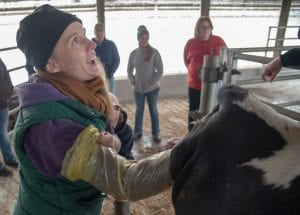If there is one thing I’ve learned since joining the team in May, it’s that dairy farms are incredible businesses. Farmers manage people, land, equipment, infrastructure, and, of course, animals. Their complex and dynamic production systems generate milk rich in protein and butterfat, which is hauled to one of several regional plants for processing.
Despite the gloomy economic aura hovering around the dairy industry, the level of production across our six counties remains as impressive as ever. According to numbers from the NYS Department of Agriculture and Markers, dairy farms in our 6-county region managed more than 53,000 cows in 2017. In just one month of 2017, our 310 dairy farms produced 127 million pounds of milk, enough to feed 2.4 million people.
Regardless of their remarkable management and production levels, dairy farmers are facing immense personal and financial stress. After three years of low milk prices, farms are encountering cash flow constraints, even after having implemented cost-cutting measures. September is a time for difficult family conversations if parents are forced to choose between paying bills for the dairy and buying back-to-school clothing and supplies for their children.
Some farm families that I’ve spoken with are questioning their decision to continue milking. I’ve heard families articulate a desire to keep farming, but also improve their quality of life. Some people feel stuck and don’t know how or what to change. Others express feeling isolated and forgotten. One farmer with a 500-cow dairy called me the other day to share his frustration that “it feels like we don’t matter anymore” to political officials or consumers.
If we could find a silver lining in the current context, it would be that many farmers are open to reexamining their goals and values, and considering new ideas. This makes for an exciting time to enter the field of agricultural extension, especially as a farm business management specialist. From my vantage point, I see great value in supporting farmers to use sound financial analysis as a foundation for making decisions and implementing changes, both on their farms and in their lives.

